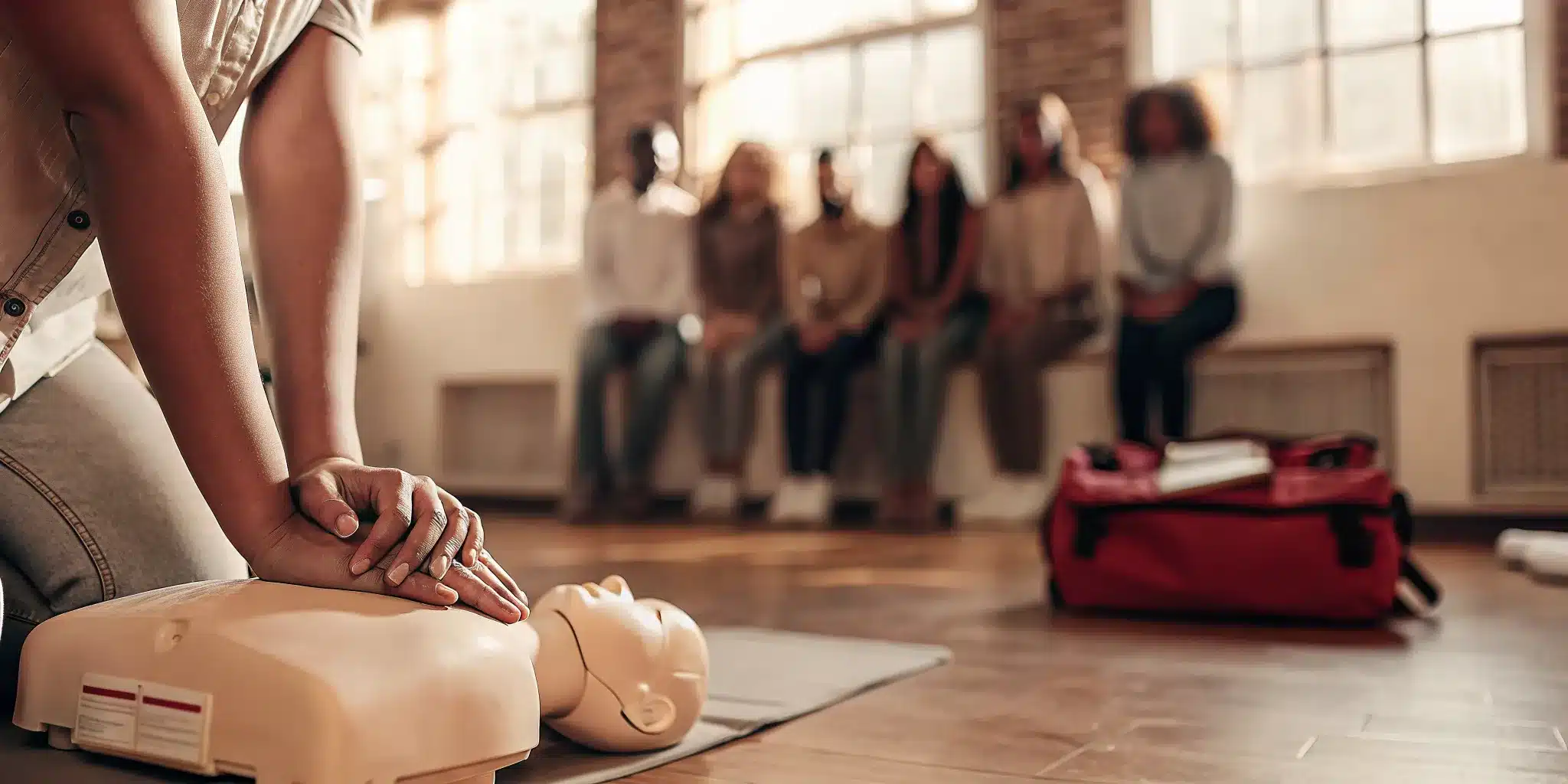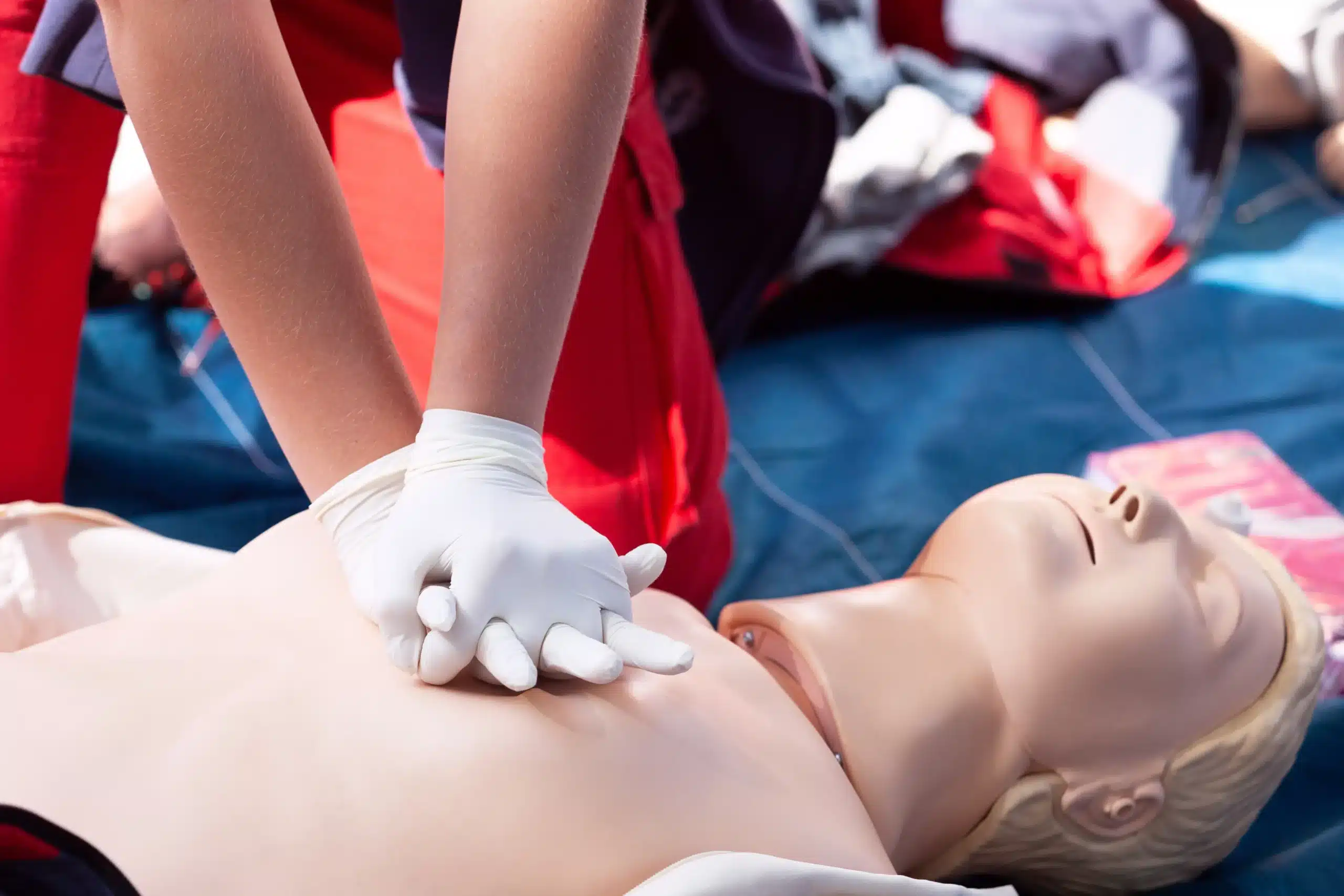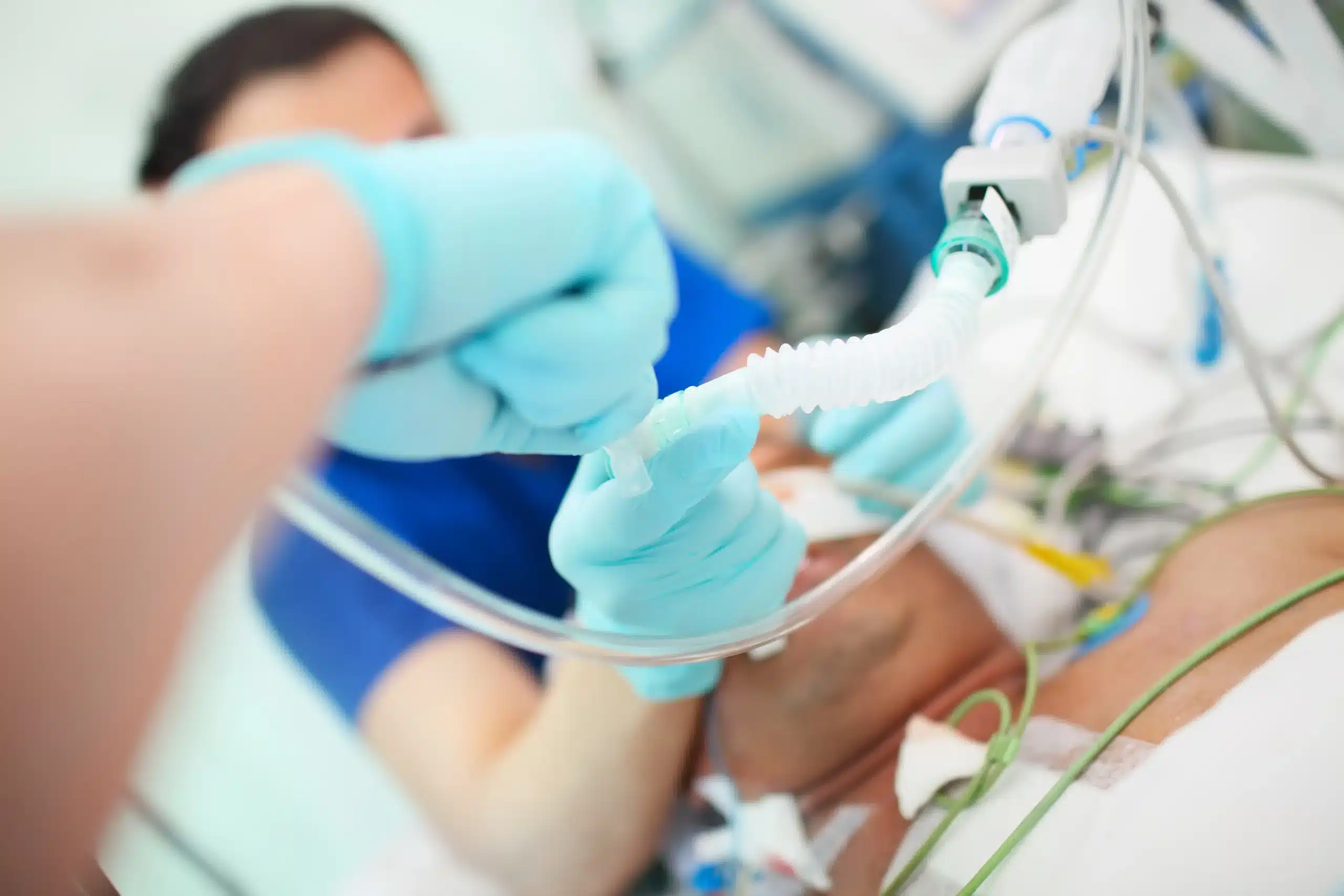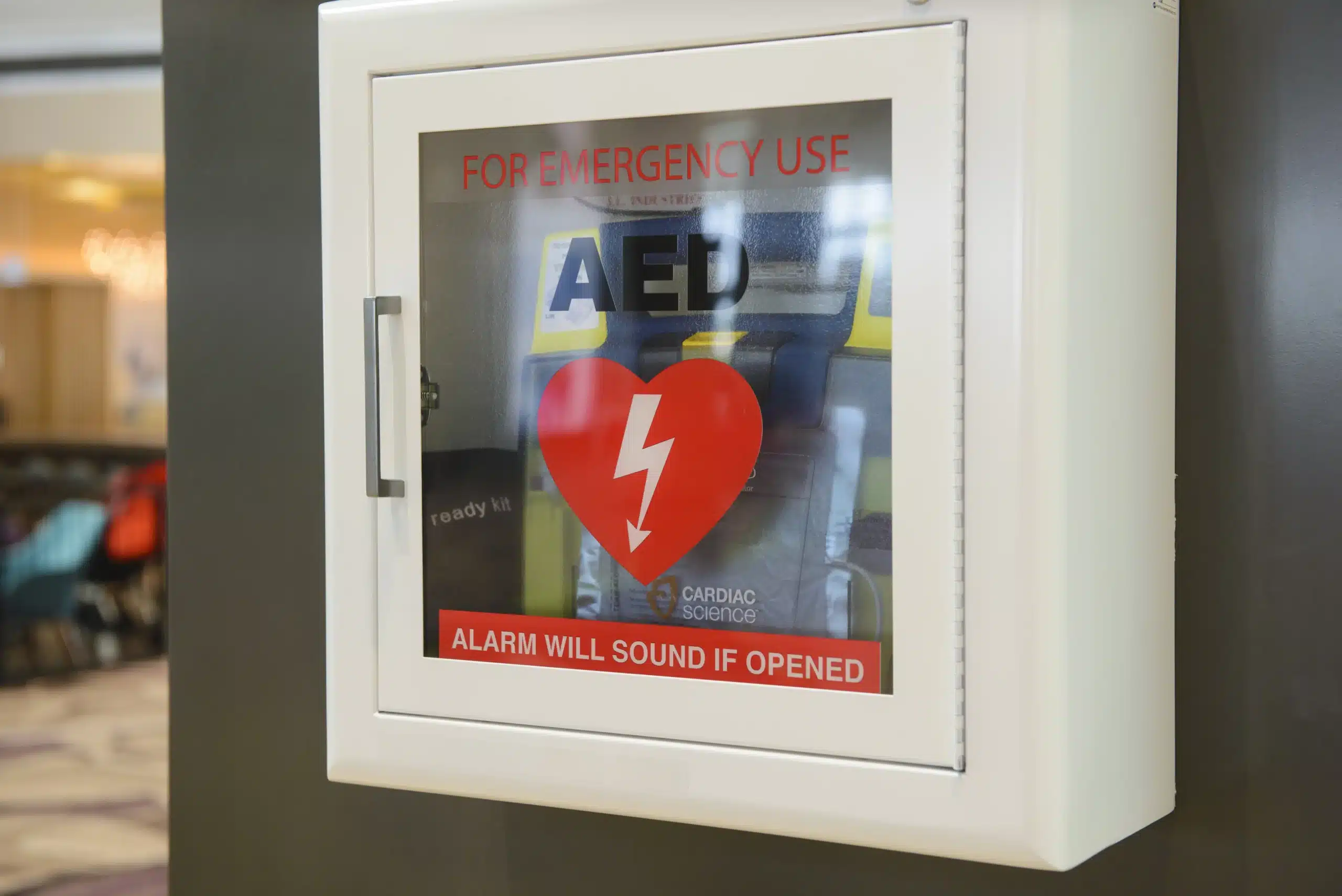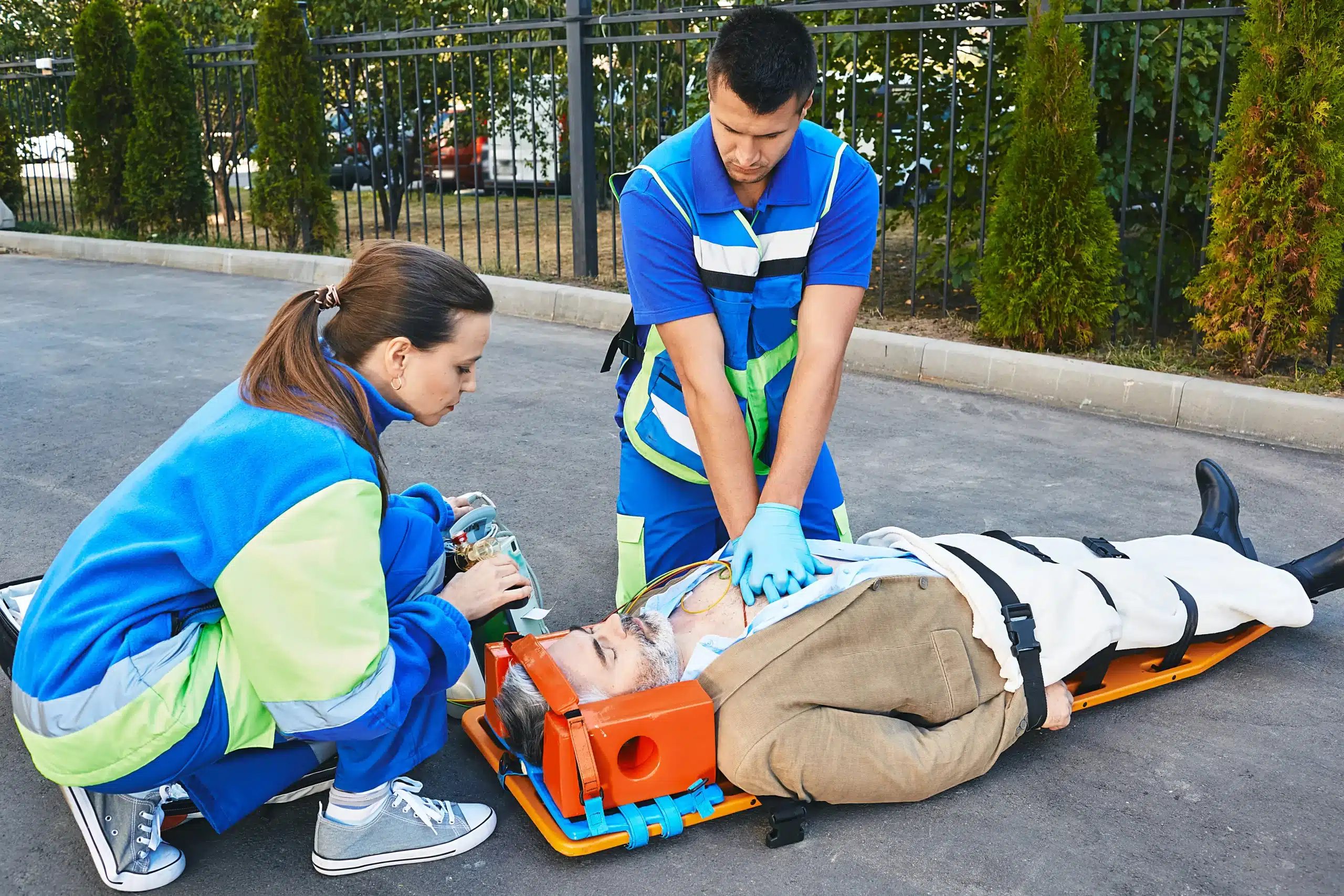Emergencies can happen anytime, anywhere. Are you prepared to respond? Learning CPR equips you with the skills and confidence to act quickly and potentially save a life. This guide is your go-to resource for finding CPR classes in Daly City. We’ll explore the different types of CPR training available, from basic CPR and first aid to advanced certifications like BLS, ACLS, and PALS. We’ll also discuss the importance of CPR in Daly City, course costs, what happens during training, and how to maintain your certification. Become a vital link in the chain of survival—get CPR certified in Daly City.
Key Takeaways
- CPR knowledge empowers you to save lives: Equipping yourself with CPR skills significantly increases the chance of survival for someone experiencing a medical emergency. Find a course and become a vital link in the chain of survival.
- Choose the right CPR class in Daly City for your needs: Explore various options, from basic community courses to advanced certifications like BLS and ACLS, to find the perfect fit for your personal or professional goals.
- Stay prepared by renewing your CPR certification: Maintain your skills and confidence by recertifying every two years. Refresher courses keep you up-to-date with the latest guidelines and best practices.
What is CPR and Why is it Important in Daly City?
Cardiopulmonary resuscitation (CPR) is a life-saving technique used when someone’s breathing or heartbeat has stopped. This can happen due to a heart attack, drowning, or other medical emergencies. CPR involves chest compressions and rescue breaths that circulate oxygenated blood to the brain and other vital organs. Learning CPR can dramatically increase someone’s chances of survival, potentially doubling or even tripling their odds, according to the American Heart Association.
Daly City, with its vibrant community events and active outdoor scene, makes CPR knowledge especially relevant. From neighborhood gatherings in local parks to bustling shopping centers, emergencies can arise unexpectedly. Being prepared and knowing how to perform CPR can make a real difference. Bay Area CPR emphasizes how important these skills are for Daly City residents.
CPR training empowers individuals to respond effectively under pressure. It provides the confidence and practical skills to act quickly when every second counts. This training is especially important for healthcare providers, as highlighted by CPR Select. However, everyone in the community benefits when more people are trained in CPR. Taking a CPR class makes you a valuable link in the chain of survival, contributing to a more prepared and resilient community.
CPR Classes in Daly City: What Are Your Options?
Finding the right CPR class can feel overwhelming, but it doesn’t have to be. Daly City offers a range of courses designed to meet various needs, from healthcare professionals to concerned citizens. Let’s break down the most common types of CPR training available in Daly City.
Basic Life Support (BLS)
BLS certification provides the foundational skills needed to respond to life-threatening emergencies. These courses cover core techniques like CPR, how to recognize the signs of someone having a heart attack or stroke, and how to use an AED. BLS certification is a prerequisite for many healthcare jobs and is valuable for anyone who wants to be prepared to help in a crisis. Safety Training Seminars offers an American Heart Association BLS course in nearby San Mateo.
Advanced Cardiovascular Life Support (ACLS)
ACLS training builds upon the fundamentals of BLS, focusing on advanced techniques for managing cardiovascular emergencies. These courses are designed for healthcare professionals, such as doctors, nurses, and paramedics, who are often the first responders in these situations. ACLS certification demonstrates a higher level of expertise in handling complex medical emergencies. Safety Training Seminars offers an AHA-certified ACLS course in San Mateo.
Pediatric Advanced Life Support (PALS)
PALS certification focuses on the specific needs of infants and children facing medical emergencies. These courses equip healthcare providers with the skills to assess, stabilize, and treat young patients in critical situations. PALS certification is essential for pediatricians, pediatric nurses, and other healthcare professionals working with children. Contact Safety Training Seminars for information on PALS courses near Daly City.
First Aid and CPR Combination Courses
Combining first aid and CPR training offers a well-rounded approach to emergency preparedness. These courses cover a broader range of situations, from treating minor injuries like cuts and burns to responding to life-threatening emergencies like heart attacks and choking. This combined approach is particularly useful for childcare providers, teachers, and anyone who wants to be prepared for a wider variety of situations. Safety Training Seminars offers AHA-certified CPR and first aid training in San Mateo.
CPR Class Costs in Daly City
CPR certification is an investment in yourself and your community. Understanding associated costs will help you budget accordingly. While pricing varies by provider and course type, this section offers a general overview of what to expect in Daly City. Always check with your chosen provider for their most up-to-date pricing.
Course Prices
The cost of your CPR class depends on the certification level you need. Basic Life Support (BLS) certification, for example, often starts around $75 at many training centers. This typically covers instruction, skills practice, and testing required for your certification card. Safety Training Seminars offers a low price guarantee for all courses, including BLS, ACLS, and PALS. Compare our prices—we’ll match any lower advertised price.
Additional Fees & Materials
Some courses may require additional materials, like textbooks or pocket masks. Some providers include these in the course fee, while others charge separately. A BLS provider manual, for instance, might cost around $20. Always ask your training center about required materials and associated costs upfront to avoid surprises. Safety Training Seminars lists required materials for each course on our website.
Group Discounts
If you’re training a group, like workplace colleagues or a community organization, ask about group discounts. Many CPR training providers offer reduced rates for group bookings. This can be a cost-effective way to certify and empower more people with life-saving skills. Contact Safety Training Seminars to discuss options for group training and customized pricing.
Find CPR Classes in Daly City
Finding the right CPR class in Daly City means considering several factors, from the type of certification you need to the location and schedule that best suits you. This section breaks down some of the top CPR training providers and what they offer.
Top CPR Training Providers
Safety Training Seminars
Safety Training Seminars offers a comprehensive range of CPR and first-aid training in Daly City and over 60 other locations. They provide everything from basic CPR and first aid to advanced certifications like BLS, ACLS, and PALS. Known for their commitment to excellent customer service and a low-price guarantee, Safety Training Seminars is a reliable choice for individuals and groups seeking high-quality training. Their courses meet American Heart Association guidelines, ensuring you receive a recognized and respected certification. They also offer convenient RQI programs for healthcare professionals needing to renew their certifications. Serving Daly City from their nearby San Mateo location, Safety Training Seminars makes high-quality training accessible to residents of surrounding areas like Millbrae.
Positive Heart CPR
Positive Heart CPR, located in Daly City, has earned a stellar reputation for its CPR training programs. They offer courses in BLS, ACLS, and PALS. Contact them directly to learn more about their current course offerings and schedules.
Rescue With CPR
Rescue With CPR is another reputable provider of CPR training in Daly City. They offer a range of American Heart Association-certified courses, including CPR, BLS, and ACLS. Their focus on practical skills and real-world scenarios makes them a solid option for anyone looking to become confident in responding to emergencies.
Class Locations & Schedules
Daly City offers several convenient locations for CPR training, making it easy to find a class near you. Many providers offer flexible schedules, including weekend and evening options, to accommodate busy lifestyles. Always check with the specific training provider for the most up-to-date schedule and location information.
What Happens in a Daly City CPR Class?
Want to know what to expect in a Daly City CPR class? Here’s a quick rundown to help you prepare.
Course Length & Format
Daly City CPR classes are designed to be comprehensive and convenient. Classes are typically held at 333 Gellert Blvd, Suite 215, Daly City, CA 94015, and run daily from 8 am to 10 pm. This flexibility makes it easier to fit a class into your schedule. Check with your chosen provider, like Safety Training Seminars, for their specific schedule and any available weekend options. Safety Training Seminars offers a low price guarantee, ensuring you get the best value for your training.
Hands-on Practice
CPR classes in Daly City prioritize hands-on learning. You’ll spend a significant portion of the class practicing essential skills like chest compressions, rescue breaths, and using an AED. Courses cover techniques such as BLS (Basic Life Support) CPR, ACLS (Advanced Cardiac Life Support), and PALS (Pediatric Advanced Life Support), often including ECG/Pharmacology components. This practical training builds your confidence and prepares you to respond effectively in a real emergency. For those needing these advanced certifications, explore the ACLS courses offered by Safety Training Seminars.
Certification
After successfully completing your CPR class, you’ll receive an American Heart Association (AHA) certification card. This certification is valid for two years and demonstrates your CPR proficiency. It’s a valuable credential for healthcare professionals, childcare providers, and anyone who wants to be prepared for emergencies. Many healthcare providers benefit from the RQI program offered by Safety Training Seminars to maintain their certifications. Remember to check with your chosen training center to confirm they offer AHA certification.
Choose the Right CPR Class
Knowing which CPR class is right for you depends on your specific needs. Are you a healthcare provider, or do you want to be prepared for emergencies at home or in the workplace? Understanding the different levels of certification will help you make the best choice.
Healthcare Professional Requirements
Healthcare professionals, including doctors, nurses, and EMTs, often require BLS certification. This training covers essential life-saving skills for adult, child, and infant patients, including CPR, AED use, and relief of choking. BLS certification emphasizes effective response in critical situations, ensuring patients receive immediate care. It also covers advanced airway management and other skills necessary for professional healthcare settings. Many employers require healthcare providers to maintain current BLS certification, making it a vital credential for career advancement.
General Public & Workplace Certifications
CPR and first-aid training are valuable for everyone, not just healthcare professionals. Learning these skills empowers you to respond effectively to emergencies at home, in the workplace, or in your community. CPR and first-aid certification courses teach how to recognize and respond to various emergencies, from minor injuries to life-threatening situations. These courses are especially relevant for those working with children, like teachers and childcare providers, or in environments where accidents are more common. Even if it’s not a job requirement, having these skills can make a real difference in someone’s life. For residents of Daly City, local CPR classes offer a convenient way to gain these important skills.
Instructor Qualifications
When choosing a CPR class, consider the instructor’s qualifications. Experienced, certified instructors can effectively communicate complex information and create a positive learning environment. Look for instructors certified by reputable organizations like the American Heart Association. A good instructor will not only teach the techniques but also address common misconceptions about CPR, ensuring you’re prepared to act confidently in a real emergency. They can also offer personalized feedback and answer any questions you may have, making your training experience more valuable. Safety Training Seminars prioritizes high-quality instruction, ensuring our instructors are experienced and certified to provide the best possible training. We also offer a low price guarantee, so you can be confident you’re getting the best value for your training investment.
Register for a CPR Class
Ready to learn CPR? Registering for a class is straightforward, and we’ll guide you through the process.
Register Online
Signing up for a CPR class is often easiest online. Many providers, including Safety Training Seminars, offer quick and simple online registration. You can browse available dates, choose a convenient time, and complete your registration in minutes. This streamlined process makes it easy to fit lifesaving skills into your busy schedule.
Requirements & Prerequisites
One of the biggest misconceptions about CPR training is that you need prior certification. This simply isn’t true. Anyone can learn CPR. There are no prerequisites for taking a basic CPR or first-aid course. Richmond Training Concepts discusses this and other common CPR myths, empowering anyone to act in emergencies. So, don’t let perceived barriers hold you back.
Payment Options
Most CPR classes require payment upon registration. Providers typically accept various payment methods, including credit cards. Some providers may also accept cash or offer payment plans. Positive Heart CPR, for example, offers insights into course pricing and additional options like purchasing textbooks and group discounts. Always check with your chosen provider, like Safety Training Seminars, for their specific pricing details and accepted payment methods. Knowing the costs upfront helps you budget accordingly and prepare for your training.
Benefits of Daly City CPR Classes
Choosing a local CPR class in Daly City offers distinct advantages. It’s more than just convenience; it’s about community engagement and tailored instruction. Here’s why taking a CPR class in Daly City makes sense:
Local Expertise & Community Focus
Daly City CPR classes are often taught by instructors deeply rooted in the community. For example, Safety Training Seminars, a woman-owned AHA Training Center, provides high-quality American Heart Association courses right here in Daly City. This local focus means the training is relevant to the specific needs and standards of our community. Instructors are familiar with local resources and can offer insights tailored to Daly City residents.
Flexible Schedules
Balancing work, family, and other commitments can make it tough to fit in extra training. Daly City CPR classes understand this and offer flexible scheduling to accommodate busy lifestyles. Safety Training Seminars, for instance, holds classes at their Daly City location (333 Gellert Blvd) with daily operating hours from 8 am to 10 pm. This flexibility makes it easier to find a time that works, so you can prioritize learning these life-saving skills.
Immediate Certification Cards
In many situations, you need proof of your CPR certification quickly. Daly City CPR classes often provide same-day certification cards upon completion of the course. This is a huge benefit if you need to meet employment requirements or simply want the peace of mind of being prepared for an emergency. You’ll leave the class ready to put your new skills into action.
CPR Training Myths
CPR is a life-saving skill, but several misconceptions can prevent people from learning it or using it effectively. Let’s clear up some common myths about CPR training.
Debunking Myths
One persistent myth is that CPR always revives someone experiencing cardiac arrest. While CPR significantly increases the chances of survival by maintaining blood flow, it doesn’t guarantee revival. CPR keeps vital organs oxygenated, giving the person a better chance of recovery once paramedics arrive. It’s important to understand that CPR itself doesn’t restart the heart; that usually requires defibrillation. Another common misconception is that only medical professionals can perform CPR. The truth is, anyone can and should learn CPR. Bystanders are often the first on the scene, and knowing basic CPR empowers you to provide immediate assistance.
The Importance of Proper Training
Dispelling these CPR myths is crucial for encouraging more people to learn CPR and respond confidently in emergencies. These misunderstandings can create hesitation, leading to fewer people willing to help when needed. Proper training not only teaches you the correct techniques but also builds your confidence to act quickly and effectively. Understanding the realities of CPR empowers you to make a real difference.
Maintain Your CPR Certification
Keeping your CPR skills sharp isn’t a one-time thing. Regular renewal ensures you’re always ready to respond effectively in a crisis.
Renewal Requirements
CPR certifications, like those offered by the American Heart Association, are typically valid for two years. This means you’ll need to recertify to maintain your credentials and stay current with the latest guidelines. Check your certification card for the exact expiration date and give yourself plenty of time to schedule your renewal course. Don’t let your skills lapse—stay prepared!
Continuing Education
Renewing your CPR certification isn’t just about checking a box; it’s about continually refining your life-saving abilities. Refresher courses reinforce core techniques and introduce any updated protocols, ensuring you provide the most effective care. This ongoing education benefits both the person receiving CPR and the rescuer, building confidence and competence in emergencies. Plus, maintaining your certification demonstrates your commitment to high-quality care, a valuable asset in any healthcare setting. Explore resources like Skill Up Health for more insights into the advantages of continuing education in healthcare.
Related Articles
- CPR Certification in San Mateo: Your Guide – San Mateo CPR Classes
- Why CPR is Important in Healthcare – San Mateo CPR Classes
- First Aid Training Courses in San Mateo: A Practical Guide – San Mateo CPR Classes
- CPR Myths Debunked for Better Life-Saving Skills
- Essential CPR & First-Aid Training for Workplaces
Frequently Asked Questions
How much does CPR training cost in Daly City? CPR class costs vary depending on the level of certification and the training provider. Basic CPR classes often start around $75, while more advanced certifications like ACLS and PALS are typically more expensive. Look for providers like Safety Training Seminars who offer a low-price guarantee. Also, inquire about group discounts if you’re training with others. Don’t forget to factor in potential costs for course materials like textbooks or pocket masks.
What’s the difference between BLS, ACLS, and PALS? BLS (Basic Life Support) teaches fundamental CPR skills for everyone. ACLS (Advanced Cardiovascular Life Support) builds upon BLS and is designed for healthcare professionals responding to complex cardiovascular emergencies. PALS (Pediatric Advanced Life Support) focuses on the specific needs of infants and children in medical crises.
Where can I find CPR classes in Daly City? Several organizations offer CPR training in Daly City, including Safety Training Seminars, Positive Heart CPR, and Rescue With CPR. When choosing a provider, consider factors like location, schedule, instructor qualifications, and the type of certification offered. Check online for course schedules and registration information.
Do I need any prior medical experience to take a CPR class? Absolutely not! Anyone can learn CPR. There are no prerequisites for taking a basic CPR or first-aid class. These courses are designed for people of all backgrounds and experience levels.
How long is a CPR certification valid, and how do I renew it? Most CPR certifications are valid for two years. To renew, you’ll need to take a recertification course before your current certification expires. This refresher course reinforces your skills and introduces any updated guidelines. Contact your original training provider or another certified organization to find a renewal course.
